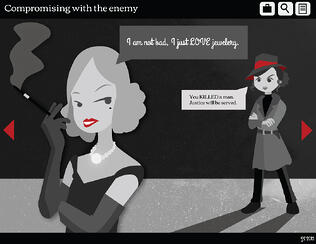Blog
Generational Learning Design: 3 Ways to Overcome the Need to be "Cool"
As a kid, I was terrified to ride a bike without training wheels. I told my exasperated father all the reasons why I was sure this crazy bike-riding ...


3 Reasons Why Failure is Life's Most Honest Teacher
By Hannah Hunter | October 13, 2014 | Custom Learning | 0 Comments

As a kid, I was terrified to ride a bike without training wheels. I told my exasperated father all the reasons why I was sure this crazy bike-riding plan of his would not work: “The sidewalk is hard and bicycles – have you seen a bicycle lately? Those wheels are very skinny and the seats are high up. Those things are deathtraps and I’m just going to fall and probably die.” But my Dad was determined and he eventually got me on the bike and peddling. I immediately crashed into a tree. However, I learned three very important lessons that day: 1) steering, 2) braking, and, most importantly, 3) falling isn’t something to be afraid of. The worst thing I thought could happen wasn’t that bad. I didn’t die. I didn’t even get hurt. Failing gave me the courage to persevere and the tools to do it.
Failure is life’s most honest teacher. It doesn’t sugarcoat the truth or grade on a curve. It doesn’t accept extra credit or give bonus points for effort. Failure is always happy to bluntly and mercilessly point out our faults and for that we hate it—but we shouldn’t. It’s natural to struggle when learning anything challenging for the first time. In fact, one of the greatest gifts we can give our learners is the opportunity to fail in the safe, simulated environment of a classroom or e-learning course. Here’s why:
-
Failure forces us to face our fears
As demonstrated in my biking story, fear of failure often keeps us from achieving our potential. We’ve all had the experience of freezing up at a critical moment because we felt unprepared and afraid to say or do the wrong thing. The fear of taking action keeps us from learning the consequences of our actions—good and bad. Sure, we might make a mistake and be totally embarrassed. But, the anticipation of failure is almost always worse than the real thing and by not acting, we are also not giving ourselves the chance to be good at something. Encourage your learners to ask questions, experiment, and try different solutions. Encourage them to dive in head first and get things wrong. Create a learning environment where initial failure is both expected and seen as an opportunity to get it right the next time.
-
Failure builds resilience
We all admire a person with grit, hutzpah, moxie, audacity. The person who never gives up even against impossible odds is revered both in real life and fiction. We want resilient employees because when the going gets tough, those people will buckle down, work hard, and won’t run from a challenge. No one gains resilience by being handed all the answers on a silver platter (or click-through elearning course). I mean, would Odysseus be much of a hero if he’d had a GPS and sailed uneventfully home? Resilience requires struggle and practice. As learning professionals, we can foster this by identifying our learners’ skill gaps and giving them multiple ways to practice until they feel comfortable. Incorporating gaming into learning is a great way to do this in a fun, non-threatening way. Harness your learners’ competitive nature through scoring, “leveling up,” timed challenges, or unlockable surprises. If they’re having fun, it won’t feel like practice. -
Failure tells us the truth
Sometimes we think we know it all only to find out later that we were so utterly, utterly wrong. Maybe we didn’t consider a critical factor when making our plan or perhaps we thought we could save time by cutting corners and our work suffered from it. Failure gives us the humility to ask when we don’t know and the clarity to identify areas of ourselves that need the most focus. It is good to figure out our strengths and blind spots early in the process so that we can make adjustments and come back better than before. This type of iterative process is what our SAM model is based on! Let your learners do what they think is best. Then give them detailed, encouraging, and individualized feedback to help them identify what was right about their method and what was not. Giving information through delayed feedback rather than all up front is much easier to remember because it is personalized and tied to an action. We remember what we do.
Failure is a gift. It helps us identify our strengths and weaknesses and forces us to push through adversity. It makes us stronger and helps us adapt to new challenges and think outside our comfort zone. Failure is the most meaningful, memorable, and motivational teacher there is and as learning professionals, we should strive to give our learners the opportunity to experience these challenges in the safe environment of training. Through challenging interactions, delayed feedback, and lots of practice we can build a smarter, stronger, and more confident workforce.
Want to share this post? Here are some ready made tweets!
Click to Tweet: Learn the 3 reasons why failure is life's most honest teacher http://hubs.ly/y0cJzR0 by @HannahVB1 #elearningdesign
Click to Tweet: Create a #learning environment where initial failure is seen as an opportunity to get it right the next time. http://hubs.ly/y0cJzR0
Click to Tweet: Failure is a gift. It helps us identify our strengths and weaknesses and forces us to push through adversity. http://hubs.ly/y0cJzR0

About the Author: Hannah Hunter
Hannah Hunter is an instructional writer at Allen Interactions. When she’s not sharing her passion for life-long learning, Hannah enjoys painting, experimenting with new recipes, and volunteering as a creative writing tutor for middle and high school students. She also frequently blogs on Allen Interactions’ e-Learning Leadership Blog.
Comments
Would you like to leave a comment?
Related Blog Posts

By: Hannah Hunter | Jun, 2015
Category: Custom Learning

Blog
5 Scientifically-Proven Ways to Grab Attention in Your e-Learning
As a kid, I was terrified to ride a bike without training wheels. I told my exasperated father all the reasons why I was sure this crazy bike-riding ...
By: Hannah Hunter | Nov, 2015
Category: Custom Learning

Blog
4 Tips to Maximize Your e-Learning Graphic Designers' Time
As a kid, I was terrified to ride a bike without training wheels. I told my exasperated father all the reasons why I was sure this crazy bike-riding ...
By: Hannah Hunter | Jan, 2015
Category: Custom Learning


